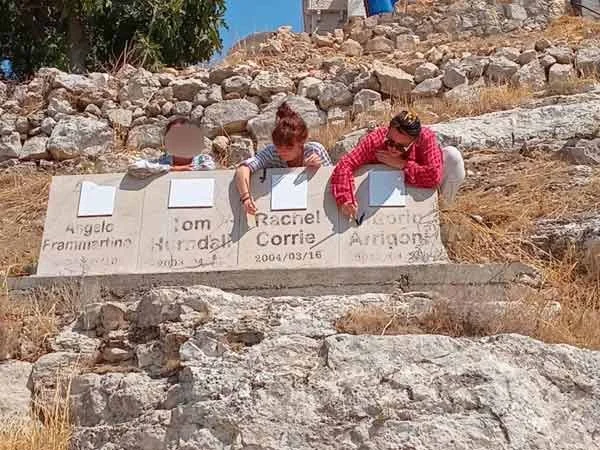American Jews were interested and involved in Palestinian rights all the way back to 1948. There's this idea that it came about just now or in the 1970s, but actually as long as there's been a Nakba. As long as there's been Palestinian refugees, there’s been American Jews concerned with that, too. I would say that a lot of times these American Jews were very well informed and spent time in the region, and they came to these conclusions often not in the United States, but over there where they were talking to the Israeli left and meeting Palestinians and seeing a situation that they don't feel is ethical or sustainable.
- GEOFFREY LEVIN
In this episode of the Speaking Out of Place podcast, Professor David Palumbo-Liu talks with Geoffrey Levin, Joel Beinin, Simone Zimmerman about the long tradition of American Jewish critiques of Israel, protests around the world against Israel’s attack on Gaza and how they have been suppressed by college administrators and national political leaders alike as being anti-Semitic and harmful to Jewish students. The US House of Congress has just passed a bill endorsing the International Holocaust Remembrance Alliance’s definition of anti-Semitism as including criticism of the State of Israel.
In this context, there could be no better time to discuss a new book by Professor Geoffrey Levin, Our Palestine Problem. In this fascinating and revealing study, Levin documents longstanding criticisms of the State of Israel, and of Zionism, by both Jewish American individuals and organizations, dating back to the early 20th century. In varying degrees, since the founding of the State of Israel, American Jews have argued for Palestinian rights, for their enfranchisement, for their repatriation, and some for a Palestinian state.
Also joining the discussion is the eminent historian Professor Joel Beinin and prominent Jewish American activist Simone Zimmerman, who is co-founder of If Not Now and who appears in the documentary film, Israelism.
Joel Beinin is the Donald J. McLachlan Professor of History and Professor of Middle East History, Emeritus at Stanford University. His research and teaching have been focused on the history and political economy of modern Egypt, Palestine, and Israel, and the Palestinian-Israeli conflict. He has written or edited twelve books. In 2001-02 he served as president of the Middle East Studies Association of North America.
For many years Joel Beinin was a member of the editorial committee of the Middle East Research and Information Project, which provides critical reporting and analysis of state power, political economy, social hierarchies, and popular struggles in the Middle East and US policy in the region. More recently, he is a non-resident fellow of Democracy for the Arab World Now (DAWN), an American non-profit organization that advocates for democracy and human rights in the Arab world.
Geoffrey Levin is assistant professor of Middle Eastern and Jewish Studies at Emory University in Atlanta. His research interests lie at the intersection of Jewish, Arab, and modern US. histories.
Prior to joining Emory's faculty, Levin was a postdoctoral fellow at Harvard University's Center for Jewish Studies. He holds a PhD in Jewish history from New York University. Our Palestine Question, published by Yale University Press last November, is his first book. The book has been discussed media outlets including The Washington Post, The Guardian,+972 Magazine, and Jewish Currents, and it is now available as an audiobook.
Simone Zimmerman is an organizer and strategist based in Brooklyn, New York, and the co-founder of the Jewish anti-apartheid organization IfNotNow. Her personal journey is currently featured in the film Israelism, about a younger generation of American Jews who have been transformed by witnessing the reality in the West Bank and connecting with Palestinians.
*
Speaking Out of Place, which carries on the spirit of Palumbo-Liu’s book of the same title, argues against the notion that we are voiceless and powerless, and that we need politicians and pundits and experts to speak for us.
Judith Butler on Speaking Out of Place:
“In this work we see how every critical analysis of homelessness, displacement, internment, violence, and exploitation is countered by emergent and intensifying social movements that move beyond national borders to the ideal of a planetary alliance. As an activist and a scholar, Palumbo-Liu shows us what vigilance means in these times. This book takes us through the wretched landscape of our world to the ideals of social transformation, calling for a place, the planet, where collective passions can bring about a true and radical democracy.”
David Palumbo-Liu is the Louise Hewlett Nixon Professor and Professor of Comparative Literature at Stanford University. He has written widely on issues of literary criticism and theory, culture and society, race, ethnicity and indigeneity, human rights, and environmental justice. His books include The Deliverance of Others: Reading Literature in a Global Age, and Speaking Out of Place: Getting Our Political Voices Back. His writing has appeared in The Washington Post, The Guardian, The Nation, Al Jazeera, Jacobin, Truthout, and other venues.
Twitter/X @palumboliu
Apple Podcasts · Spotify · Website · Instagram















































































